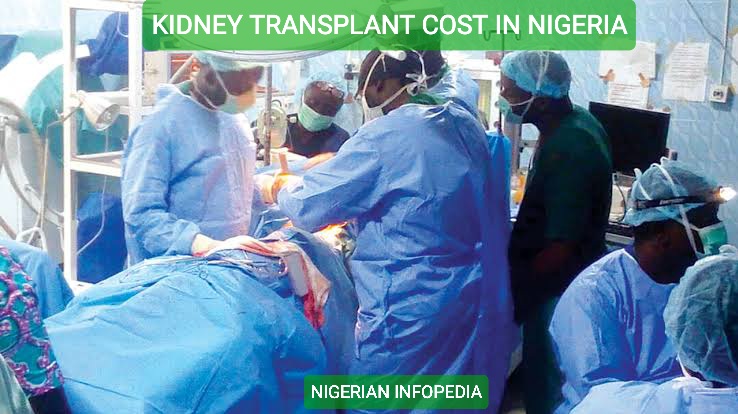Cost of Kidney Transplant in Nigeria (2024)
In recent years, there has been a noticeable rise in the number of kidney-related cases reported by individuals in Nigeria. Even though there are treatments for moderate renal problems, kidney transplantation is the main treatment for serious situations. A kidney transplant is a surgical procedure where a patient whose kidneys are no longer functioning correctly receives a healthy kidney from a living or deceased donor.

We’ll look at the essential information about kidney transplants in this article. This will enable us to determine the cost of the treatment in Nigeria.
WHAT IS THE COST OF KIDNEY TRANSPLANT IN NIGERIA?
Let’s put it straight, no matter where, how or when they are performed, kidney transplants are typically pricey. With the exception of the fact that the procedure is highly sensitive, keeping the kidney that will be donated, whether it comes from a dead person or a living person, is a difficult operation. These and numerous more factors go toward explaining why the surgery is pricey.
Kidney transplant costs can vary just like liver transplant. The sort of kidney transplant the patient is seeking, the nature and state of the donor (dead or living), the hospital (whether government-owned or private), the packages and pharmaceuticals that come with the treatment, and some other comparable elements are the main causes of the variation. Taking these into account, kidney transplants in Nigeria range in price from ₦4.7 million to ₦7 million.
FACTORS AFFECTING THE COST OF KIDNEY TRANSPLANT IN NIGERIA
A few of the variables that affect kidney transplant cost are as follows.
THE KIND AND CONDITION OF THE DONOR
The operation you decide to have primarily determines how much money you will spend on the procedure. The type to choose is typically recommended by the doctor, and this is heavily influenced by the donor’s health. There are three primary types: a kidney transplant from a deceased donor, a kidney transplant from a living donor, and a kidney transplant performed in anticipation of a kidney transplant from a deceased donor. The cost of different kidney transplant types varies. The medical professional should typically be in the best position to advise which to go for, given the resources are available, based on the circumstances and condition.
COSTS OF TEST PRE AND POST KIDNEY TRANSPLANT
This is another another element that either directly or indirectly affects how much you will pay for the kidney transplant. Usually, a number of tests and examinations would have been necessary to diagnose kidney problems requiring transplantation. You might have to take the cost of the various tests into account. Even after the transplant, patients might still be required to undergo a number of tests. It can cost as little as N1,000 or as much as N50,000 to take a test, depending on the type and the hospital.
THE KIND OF HOSPITAL YOU WANT FOR YOUR SURGERY
This is yet another important aspect to take into account when estimating the price of a kidney transplant. The cost of a kidney transplant in Nigeria is not predetermined and primarily relies on the location. Medical operations like this are typically less expensive in Federal and State hospitals, whether they are teaching hospitals or medical centers. Private hospitals, on the other hand, do not fit this description. Even though some private clinics have doctors with comparable experience and skill, they are significantly more expensive than government-run hospitals.
WHAT YOU SHOULD KNOW ABOUT KIDNEY TRANSPLANT
Surgery is used in kidney transplants to replace a sick kidney with a healthy kidneys from a living or deceased donor. The patient no longer requires dialysis since the donated kidney performs the functions of two failing kidneys.
The bean-shaped kidneys are located on either side of the spine, slightly below the ribs. Urine production serves as the primary filter, removing extra waste, minerals, and fluid from the circulation. When the kidneys can no longer filter these wastes, dangerous quantities of fluid and waste build up in the body, necessitating a kidney transplant. Even worse, renal failure could develop as a result of this raising blood pressure.
A new kidney is implanted in the lower abdomen during the transplant procedure, and its artery and vein are joined to the body’s artery and vein.
REASONS FOR KIDNEY TRANSPLANT
In general, kidney transplants are used to treat renal failures or, in certain circumstances, to prevent them. This treatment can reverse end-stage renal disease or treat chronic kidney disease, making patients feel considerably better and healthier.
SIDE EFFECTS/COMPLICATIONS OF KIDNEY TRANSPLANT
Kidney transplant complications are similar to those of most other medical procedures. It should be mentioned that not every patient with a kidney transplant goes through this. In actuality, while many patients encounter short-term issues that go away after a while, only a small number experience more severe difficulties that may even necessitate another surgery.
Here are a few of the brief side effects that people have mentioned throughout time.
INFECTION
There have been reports of minor infections following kidney transplants, including UTIs, colds, and flu. There have been a few reports of more severe infections, such as pneumonia and cytomegalovirus (CMV).
BLOOD CLOTS
Blood clots have the potential to build up in the arteries connected to the donated kidney. Rarely does something like this occur.
NARROWING OF AN ARTERY
Some patients have reported experiencing arterial stenosis, or contraction of the artery leading to the donated kidney, a few days following the transplant. The illness may develop in certain circumstances months or even years following the surgery.
BLOCKED URETER
Following a kidney transplant, the ureter, which carries urine from the kidney to the bladder, may clog. Blood clots and other causes that are comparable to these may be the cause of this. This can continue for days, months, or even years, depending on the circumstances.
URINE LEAKAGE
One of the uncommon kidney transplant cases described is this one. Some people have reported that following the transplant, urine leaks from the area where the ureter attaches to the bladder. This often happens in the initial months following the operation. Usually, this approach necessitates additional surgery.
ACUTE REJECTION
As a result, the immune system suddenly starts to attack the given kidney since it perceives it as an alien tissue. This instance should be reported to the doctor as soon as possible because it is both highly uncommon and uncomfortable.

